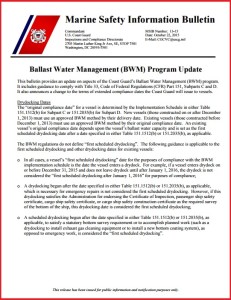The US Coast Guard has issued Marine Safety Information Bulletin MSIB 014-15 to provide information about the requirements of Checkfire Marine Electric Detection and Control Systems on board Uninspected Towing Vessels (UTV)
The Ansul “Checkfire Marine Electric Detection and Control System” does not meet the fire detection system requirements of 46 CFR Subchapter C. Checkfire Marine systems have been found on board some UTVs during Coast Guard compliance examinations. 46 CFR Part 27.203(a) requires each detector, each control panel, and each fire alarm to be Coast Guard approved or listed by an independent testing laboratory. The Coast Guard Certificate of Approval under approval number 161.002/40/1 states, “Approved for use only in Small Passenger Vessels meeting 46 CFR Subchapter T that have only DC electrical power.” The Coast Guard Lifesaving and Fire Safety Division (CG-ENG-4) has determined this approval is not appropriate for UTVs.
While some other Checkfire detection systems are listed (approved) by FM, the Checkfire Marine system is not currently listed by an independent testing laboratory. Checkfire Marine fire detection systems installed after the date of this MSIB will not be accepted as evidence of meeting the regulatory requirements for fire detection on UTVs. Vessel owners who installed a Checkfire Marine fire detection system on board a UTV prior to the date of this MSIB, who think the installed Checkfire Marine provides the vessel with an equivalent level of safety as a fire detection system described in 46 CFR 27.203(a) through (g), can submit an equivalency request to the CG-ENG-4 in accordance with 46 CFR 24.15-
1. Guidance on submitting an equivalency request can be found on the Towing Vessel National Center of
Expertise website at:http://www.uscg.mil/hq/cg5/TVNCOE/ExemptionsAppealsEquivalencies.asp
Coast Guard Inspectors/Examiners who find Checkfire Marine detection systems that were installed on board UTVs prior to the publication of this MSIB should request objective evidence from the owner showing an equivalency has been granted by CG-ENG-4 or an equivalency request has been submitted to CG-ENG-4 and is being evaluated. If the equivalency request for the vessel has been approved by CG-ENG-4, the vessel should be considered to be in compliance with the fire detection requirements of Subchapter C as long as the system is operating properly. If an equivalency request is still under consideration by CG-ENG-4, until a determination is made, the Checkfire Marine system should not be required to be replaced as long as it is operating properly. Instead, the Inspector/Examiner should place an inspection note in MISLE, valid for one year, stating “This vessel’s fire detection system does not currently meet the requirements of 46 CFR 27.203(a); however, an equivalency request IAW 46 CFR 24.15-1 has been submitted by the vessel owner to Commandant.
Inspectors/Examiners should not require this equipment to be removed until the request has been evaluated and a determination has been made about the acceptability of the system on board this vessel.” The existence of this deficiency should not be cause for removal of a Coast Guard issued decal while an equivalency request is being evaluated. If the detection system was installed after publication of this MSIB, the owner does not want to request an equivalency, or an equivalency request has been denied by CG-ENG-4, then the Checkfire Marine detection system must be replaced with one meeting the regulatory requirements listed in 46 CFR 27.203. A towing vessel decal should not be issued, or reissued, until all fire detection system issues are resolved. Sometowing vessels that are currently regulated under 46 CFR Subchapter C as uninspected towing vessels will have to comply with 46 CFR Subchapter M as inspected towing vessels when Subchapter M is published at a later date. Any approved equivalencies issued for the Checkfire Marine system will remain in effect under these new rules.
Please click below to find USCG MSIB 14-15
Source: USCG





























































